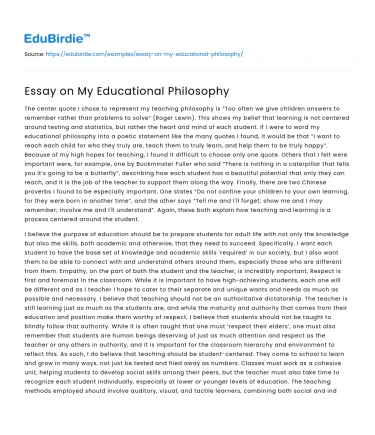The center quote I chose to represent my teaching philosophy is “Too often we give children answers to remember rather than problems to solve” (Roger Lewin). This shows my belief that learning is not centered around testing and statistics, but rather the heart and mind of each student. If I were to word my educational philosophy into a poetic statement like the many quotes I found, it would be that “I want to reach each child for who they truly are, teach them to truly learn, and help them to be truly happy”. Because of my high hopes for teaching, I found it difficult to choose only one quote. Others that I felt were important were, for example, one by Buckminster Fuller who said “There is nothing in a caterpillar that tells you it’s going to be a butterfly”, describing how each student has a beautiful potential that only they can reach, and it is the job of the teacher to support them along the way. Finally, there are two Chinese proverbs I found to be especially important. One states “Do not confine your children to your own learning, for they were born in another time”, and the other says “Tell me and I'll forget; show me and I may remember; involve me and I'll understand”. Again, these both explain how teaching and learning is a process centered around the student.
I believe the purpose of education should be to prepare students for adult life with not only the knowledge but also the skills, both academic and otherwise, that they need to succeed. Specifically, I want each student to have the base set of knowledge and academic skills ‘required’ in our society, but I also want them to be able to connect with and understand others around them, especially those who are different from them. Empathy, on the part of both the student and the teacher, is incredibly important. Respect is first and foremost in the classroom. While it is important to have high-achieving students, each one will be different and as I teacher I hope to cater to their separate and unique wants and needs as much as possible and necessary. I believe that teaching should not be an authoritative dictatorship. The teacher is still learning just as much as the students are, and while the maturity and authority that comes from their education and position make them worthy of respect, I believe that students should not be taught to blindly follow that authority. While it is often taught that one must ‘respect their elders’, one must also remember that students are human beings deserving of just as much attention and respect as the teacher or any others in authority, and it is important for the classroom hierarchy and environment to reflect this. As such, I do believe that teaching should be student-centered. They come to school to learn and grow in many ways, not just be tested and filed away as numbers. Classes must work as a cohesive unit, helping students to develop social skills among their peers, but the teacher must also take time to recognize each student individually, especially at lower or younger levels of education. The teaching methods employed should involve auditory, visual, and tactile learners, combining both social and independent work. While this balance may be hard to achieve, it is up to the teacher to understand their students’ needs and work to accommodate them. For example, a lecture would involve written work like notes, intelligent commentary from the teacher, visual aids to go along with what is presented, and any chance for discussion possible. Remember, the goal is to help students truly learn the material, not just memorize the answers. Every student needs an opportunity to share their voice, but not a requirement to do so, as, again, each student is different and expresses themselves in different ways. Once participation is required, it may seem to be a chore or another box to check for certain students. Each student should also feel represented and secure in their identities. Whether this is their culture, race, religion, gender, or anything else that makes them who they are, each student needs an equal opportunity to relate to the material being taught and the activities completed. Not every student is the same, and their uniqueness should be celebrated, not forced to blend in.
Save your time!
We can take care of your essay
- Proper editing and formatting
- Free revision, title page, and bibliography
- Flexible prices and money-back guarantee
In order to accomplish such lofty goals and seemingly unrealistic expectations for education, teachers should be kind, caring, and understanding individuals who truly believe in and enjoy what they do. It is difficult to devote so much time and mental effort to teaching, especially when so much emphasis is put on truly knowing and reaching each child. However, with the proper training and experience, teachers who are willing to go the extra mile and commit to their students will find that the students are not the only ones who are learning new things. When we as teachers open our hearts and minds to the countless possibilities the next generations have to offer, we will never stop learning and growing in our respect for the youth of our world.






 Stuck on your essay?
Stuck on your essay?

